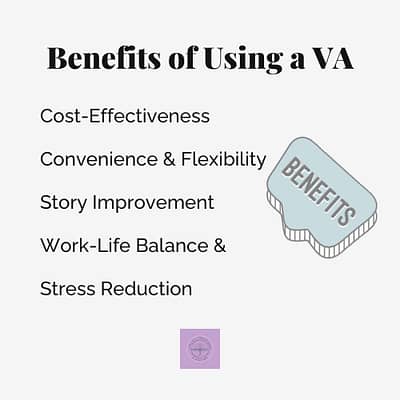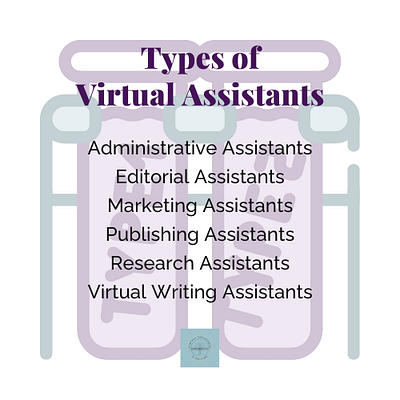
Virtual Assistants for Authors
By: Colleen Atwood - Virtual Assistant & Editor
"Do or do not. There is no try."
– Yoda
As an author, hiring a virtual assistant (VA) to help with assorted writing projects and administrative tasks may prove helpful. Delegating these tasks to someone who understands how to complete the work correctly (or within the parameters set) allows more writing time.
Today, we will look at the benefits of hiring a VA, the most desirable skills an author will want their virtual assistant to have, the types of virtual assistants an author may choose to hire, and things to remember when collaborating with your virtual assistant.
Why Hire a Virtual Assistant?
A virtual assistant is an individual who offers remote office services to clients within every industry imaginable. Not only can they manage mundane office tasks, but they can help with any other project you decide to delegate.
A recent study suggests there could be anywhere from 25,000 to 30+ million virtual assistants worldwide. However, this number will vary depending on where you look and what you classify as a virtual assistant. Freelance VAs (or individuals who offer services outside an established company) form most virtual assistants worldwide. And with nearly 70% of businesses citing cost savings as their reason to outsource office services, it makes sense for an author to consider hiring their own VA.
The Benefits of Using a Virtual Assistant for Authors
The benefits (or advantages) of using a virtual assistant for authors include (1) cost-effectiveness, (2) convenience and flexibility, (3) story improvement, and (4) work-life balance and stress reduction.

Cost-Effectiveness
Virtual assistants provide their own offices, equipment, technology, professional upgrading/training, and medical benefits, saving businesses approximately 78% of overhead costs. Most VAs charge an hourly rate or by the project (and often have multiple clients), which means the author and business do not have to worry about paying for downtime.
Convenience & Flexibility
With millions of virtual assistants available worldwide, finding and hiring the perfect virtual assistant when needed is easier than ever. Simply complete research online for a freelancer, work with a VA placement company, or hire someone offering their services on social media (after research on them).
Story Improvement
Virtual assistants can complete extensive research on specific topics to help you convey the information you want accurately to your readers. A VA can also be a second pair of eyes and offer feedback when needed. And finally, a virtual assistant can help keep track of the continuity of your story—from plot development to timeline organization.
Work-life Balance & Stress Reduction
By delegating your other tasks to a virtual assistant, you gain more hours to focus on what means the most to you: writing. Having another person manage your email, calendar, and other time-consuming projects gives you more time to write and create your story instead of stressing about finishing everything within the deadline.
Virtual Assistant Must-Have Skills
Authors should always know what skills they want their virtual assistant to have. While the specific requirements for each will vary, the essential list of must-have skills stems from the following four categories: (1) administration, (2) marketing, (3) communication and collaboration, and (4) writing and editing.
Administration. Whether evaluating brand-new VAs in the industry or someone more established, learning about their prior and existing administrative skills is crucial. Precision, organization, proactiveness, initiative, quick to learn, flexibility, technical updating, and project management are among the top skills a VA should have.
Marketing. Marketing skills will vary depending on the types of services a virtual assistant offers. Such digital marketing, online advertising, and social media management skills are standard among VAs. For more specific experience with book marketing, design and formatting, the author might need to complete more detailed research on VAs familiar with these publishing steps.
Communication and collaboration. Due to the nature of the publishing industry, authors and their assistants should work seamlessly together. Collaboration and clear communication between the parties are necessary to reduce the chances of miscommunications. If disagreements arise, both parties need to find a way to discuss the problem and resolve any issues. Listening, comprehension, and oral and written communication are essential skills for a successful virtual assistant.
Writing and editing. According to recent research, 85% of freelance virtual assistants have a website. Writing different content for the website, blog posts, social media posts, email marketing, articles, and other forms requires finesse and prior experience. Virtual assistants should love to read, have strong writing and editing skills, and have a creative streak they apply to every written work they publish.
Types of Virtual Assistants
There is no exact number of virtual assistants available worldwide. However, authors and businesses typically choose between twenty-three of the most common categories, including (1) administrative assistants, (2) editorial assistants, (3) marketing assistants, (4) publishing assistants, (5) research assistants, and (6) virtual writing assistants.

Administrative Assistants
Authors may find themselves overwhelmed with time-consuming (and redundant) administrative tasks. Staying connected with editors, the publishing house, and your audience takes precious time away from writing. Hiring a virtual assistant to manage these types of projects means you can gain more control over your time and stress levels.
Daily administrative tasks include email and calendar management, responding to inquiries and comments, organizing documentation, managing accounting procedures, and managing project management.
Editorial Assistants
The editorial team of a publishing house includes the editorial director, editor-in-chief, and managing editor (to name a few). The editorial assistant supplies administrative support to these individuals.
Typical tasks of an editorial assistant include proofreading, responding to author inquiries, reading submissions, creating reports and presentations for the editorial team, and prepping materials for publication.
Marketing Assistants
A marketing assistant manages all aspects of marketing for an author or publishing house. Like an administrative assistant, they help design, create, and monitor (or watch) media strategies, schedules, and advertising.
Other tasks include creating reports for each marketing campaign, completing research on the competition, creating reports, and occasionally posting social media and website content.
Publishing Assistants
A publishing assistant has a wide range of responsibilities, depending on the type of publishing house they work for. For example, a publishing assistant in large corporations supports the editing and publishing team. At the same time, within smaller organizations, they oversee routine administrative tasks, prepare documents for publication, and even review articles or other documents and supply feedback.
Other everyday tasks include proofreading, managing department communication, file organization, and grouping publishing data into monthly reports.
Research Assistants
Authors commonly employ research assistants to help ensure their writing and story elements are as clear (and realistic) as possible. Because researching a topic is a complex process and takes anywhere from days to months to complete, this takes time away from drafting the material for the manuscript.
Typical responsibilities include sifting through different source materials, gathering facts and cross-checking sources, summarizing the material into organized categories, and managing the data for the author.
Virtual Writing Assistants
Authors have more than just manuscripts to draft; email responses, website content, social media content, marketing campaigns, and business documents need drafting, revisions, editing, and publication.
Other everyday tasks include drafting, editing, and publishing business reports, creating buyer personas, designing landing pages, updating website SEO, and creating landing pages.
Tips & Tricks for Effective Collaboration
To help ensure the collaborative effort pays off for both parties, an author should follow the outlined steps below when collaborating with a virtual assistant.
- Ascertain your needs. Start by listing the projects you want your VA to complete and how long you expect to employ their services. Then, decide the skills you wish your virtual assistant to have (which will help you decide whether to use someone just starting in the industry or someone with more experience). Finally, decide whether you plan to hire a freelance VA or hire from a virtual assistance company.
- Research potential VAs. Begin researching for virtual assistants and create a list of possibilities. Look at their prior work experience, social media pages, website (if available), and other information you can find to decide if they are a potential fit with what you see as a collaborative partner. List your list to the top two or three and contact each VA for more information.
- Interview your prospects. Ask each virtual assistant questions about their work experience, where they see themselves going in the future, and the types of projects they have experience working on. If considering a freelance VA, be prepared to answer some questions yourself, as they will conduct an interview as a potential client just as you are interviewing them for a good fit.
- Set clear guidelines for both parties. During the interview, note what you expect to see from your potential virtual assistant. The VA will decide if they can agree and understand these expectations and may respond with their own stipulations (or conditions). Remember, compromise is key here. Finding someone else may be in your best interest if one or both parties cannot agree on specific guidelines (or if there is a lack of connection between them). Further, if the potential virtual assistant feels someone else is a better fit for what you are looking for, they will often recommend another VA.
- Delegate effectively and monitor. Micromanagement of your virtual assistant is not necessary. However, they need to understand that you will evaluate their performance throughout the process (and especially at the end).
- Be honest and give regular feedback. If you are unhappy with your VA, inform them diplomatically. If you cannot agree on fixing the issue, it might be best to part ways. Virtual assistants are always looking for ways to improve their performance and will take the feedback and do what they can to fix or correct it.
- Embrace collaborative tools. Understand that virtual assistants use many collaborative tools to stay connected to their clients. VAs use everything from email to project management technology to complete their projects. They often have access to many similar programs, allowing the author to try something new or use a technology with which they are familiar.
- Establish clear communication channels. Freelance virtual assistants typically have three to ten ways of connecting with clients. During the hiring process, they will supply a questionnaire that asks which you prefer to use. Most will learn innovative technology to satisfy their client if the preferred way is outside their list.
- Set realistic deadlines. Virtual assistants are not miracle workers, and different projects take different amounts of time. Administrative projects may only take a few hours, while marketing can take a week or more (depending on the task). Creating realistic deadlines means your virtual assistant is not hurrying through your project and returning shoddy work. (Note: Freelance virtual assistants often have many clients at one time. Further, most VAs will charge an extra fee for emergency projects with shortened timelines.)
The four benefits of an author hiring a virtual assistant include cost-effectiveness, convenience and flexibility, story improvement, work-life balance and stress reduction. The must-have skills of a VA include administration, marketing, communication and collaboration, and writing and editing (even though how much exposure they might have to each will vary). And choosing which type of virtual assistant to hire will always depend on the projects you plan to delegate.
For more information on researching, hiring, and collaborating with a virtual assistant, see The Complete Guide to Hiring a Virtual Assistant blog post. To see how Atwood LLC can help, check out the Author Assistant Services page for more details.





